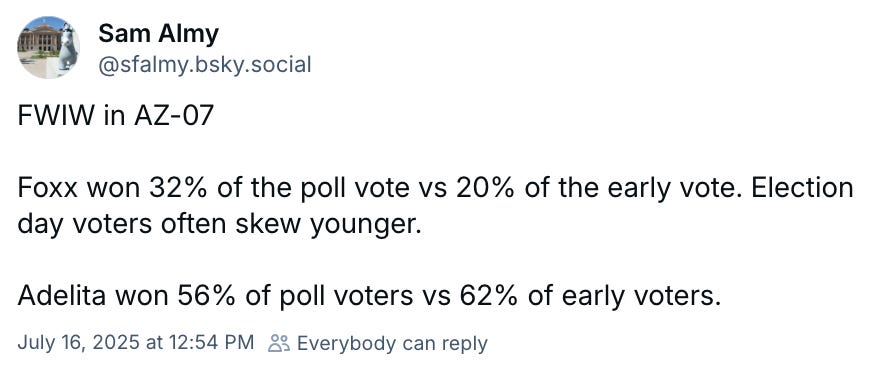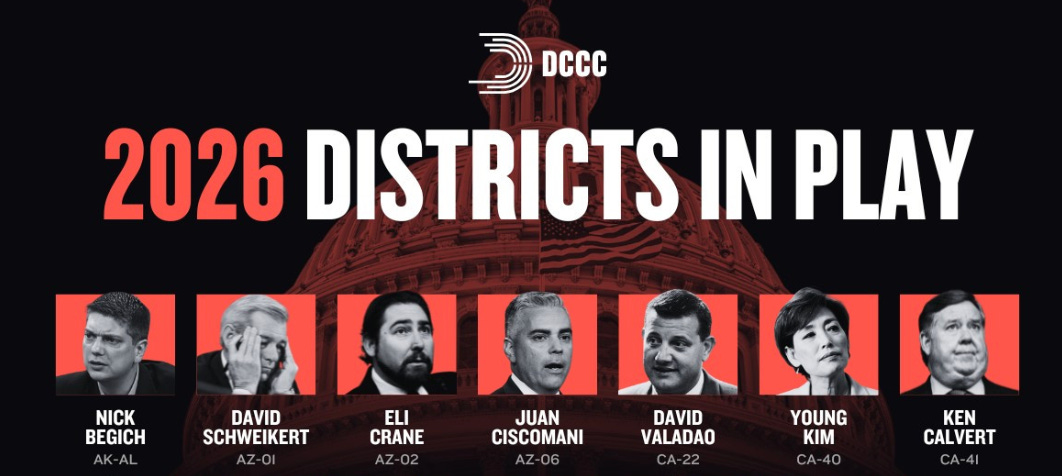Welcome to election season (again)
Democracy isn’t a spectator sport … All your borders belong to us … And even politicians don’t trust politicians.
We knew back in January that this year was going to be a busy one for elections in southern Arizona.
Now that the Congressional District 7 primaries are behind us, let’s take a moment to catch our breath ahead of this year’s local elections.
Didn’t we already have a local election, you ask?
Yes, Tucsonans voted against Proposition 414 in March, which Tucson officials hoped would provide $800 million over the next decade for police officers, firefighters, public safety-related infrastructure, housing initiatives, and community programs.
Voters rejected Prop 414 in a landslide, with 70% of voters saying no.
The measure took a lot of heat from both sides of the aisle. The liberal crowd didn’t want to add to the police budget, at the expense of other programs, like caring for unsheltered people. And conservatives weren’t pleased about raising the sales tax rate.
This week, the big election news obviously was the CD7 primaries, where former Pima County Supervisor Adelita Grijalva did almost as well as the anti-Prop 414 vote. She came away with more than 60% of the vote, far ahead of her closest rival, Deja Foxx.
But the race technically isn’t over yet.
Grijalva will face off against Republican Daniel Butierez in the special general election in September.
Dems have such a huge advantage in the district that it’s safe to say Grijalva will win the seat. Still, this could be a lively airing of grievances about the Trump administration. You can bet Grijalva will hammer Butierez for supporting Trump, while portraying herself as the antidote to Trumpism.
Meanwhile, Tucson voters are already casting ballots for the August 5 city council primary elections.
The three seats up for grabs will mean a new voting bloc on the council deciding how the city handles homelessness (such as sleeping in washes), police staffing, economic development (like any new data center company that wants to set up shop in Tucson), and countless other issues.
There’s also a recall election for three members of the South Tucson City Council in August.
The fun continues next year
While all of this might sound like a busy political year, it’s nothing compared to what’s coming in 2026.
Elections have a way of creeping up on you. And the campaigns often begin long before regular people even start thinking about the elections.
For example, what’s going to happen with the $2 billion RTA Next plan?
Local officials hoped to put it on the ballot this November, but that plan appears to have fallen apart. On Tuesday, the Pima County Board of Supervisors briefly discussed holding an election on a new plan for the RTA as late as fall 2026, but the discussion is still in the earliest of stages.
Meanwhile, Southern Arizona voters will also pick a dozen lawmakers to send (or send back) to the state Legislature in 2026. These are the people who will decide how much money local governments and schools get from the state, along with rules for everything from what students can eat in schools to how much groundwater can be pumped.
Most of them will be Democrats and therefore the minority party at the Legislature, so one of their biggest jobs will be pushing back against Republicans (unless Dems finally pull off a big win next year and become the majority party).
Southern Arizonans also will decide whether to keep U.S. Rep. Juan Ciscomani in Congressional District 6. That district is narrowly divided between the GOP and the Democrats. And Ciscomani is taking a lot of heat from voters who are upset he supported massive cuts to Medicaid.
We expect this to be a big-money election, with national Democrats putting CD6 seat on their radar to turn blue in 2026.
Then there’s ballot measures. The Legislature already sent three measures to the 2026 ballot, and they could send more when they reconvene in January.
Voters also will pick a governor, attorney general, superintendent of public instruction and a host of county officials next year. Each one of those races is sure to bring months of political fireworks.
Oh, and Tucson voters will probably be asked to renew Tucson Electric Power’s franchise agreement next spring.
We love election night and imagine you do, too. But a lot of work goes in between a candidate’s announcement and election night. Help us cover everything in between by upgrading your subscription today.
Now that the Congressional District 7 special election is over, you might have thought you’d be safe from political ads.
You’d be wrong.
The aftermath of Congressional Republicans passing the “big, beautiful bill” is making them a target from interest groups who want voters to know the real-world impacts of the budget bill. Especially if their Republican Congressman doesn’t meet with the public and largely talks to friendly outlets.
This morning, the Unrig Our Economy nonprofit launched a new ad targeting Tucson Congressman Juan Ciscomani.
It features Tucsonan Garrett Newell, who has cerebral palsy and relies on Medicaid to pay for his health care.
We spoke to Newell about his concerns about the future for himself as well as others living with chronic medical conditions.
He said he wanted southern Arizonans to know he is concerned that Ciscomani won’t stand up for his constituents, with his recent vote on the budget bill as evidence he puts politics ahead of people.
This isn’t the first time Unrig Our Economy has run ads targeting the Tucson congressman.
Here's their July 4th ad the PAC ran highlighting Ciscomani's support for the “big, beautiful bill.”
Literally militarizing the border: The Trump administration is planning to convert about one-third of Arizona’s border with Mexico into a military installation, which allows officials to charge migrants with trespassing on a military base, KJZZ’s Alisa Reznick reports. The military installation would extend from Yuma to the western border of the Tohono O’odham Nation reservation. This is the next step in the Trump administration’s bid to turn the entire U.S.-Mexico border into military property (with the HQ at Fort Huachuca), and they’ve already done the same with a stretch of the border in New Mexico earlier this year.
Embezzlement red flags: The Pima County Sheriff’s Department is investigating the Green Valley Domestic Water Improvement District over concerns an employee has been embezzling money there for years, the Green Valley News reports. Officials aren’t spilling the details yet, but the district said it found and reported suspicious activity on July 10, and one employee is on administrative leave.
It’s not all bad news: Here’s some good news for hundreds of thousands of Arizonans with medical debt. A nonprofit partnered with Gov. Katie Hobbs to erase that debt, KGUN’s Ashley Loose reported. The nonprofit, Undue Medical Debt, is using some of Arizona’s share of American Rescue Plan funds to buy medical debt from hospitals and collection agencies for pennies on the dollar. So keep an eye out for a letter in the mail with the good news.
Keeping it old school: If you want to learn horseshoeing skills, and the wisdom that comes with caring for a horse, Tohono O’odham Community College has you covered, the Arizona Luminaria’s Shannon Conner reports. George Goode travels from the Dakotas to New Mexico to southern Arizona teaching tribal students how to trim and shoe a horse, and maybe start their own business.
Dollars incoming: After a years-long legal fight, the City of Tucson is getting $4.8 million to deal with PFAS (”forever chemicals”) in groundwater, Arizona Public Media’s Katya Mendoza reports. The money will go toward covering public funds that the city spent to manage PFAS. In time, the city is expecting to get about $30 million from a legal settlement with the company that manufactured the firefighting chemicals that led to the contamination.
Help us clean up the local news ecosystem by clicking that button.
Judge your new judge: 10 candidates are vying to fill a vacancy in Pima County Superior Court, and the Pima County Commission on Trial Court Appointments wants you to weigh in. KVOA has the details.
It’s tough being the lone Republican voice when it seems like every other elected official in Pima County has a “D” after their name.
Pima County Supervisor Steve Christy made it clear he won’t be backing any new sales tax — even one pitched as a lifeline for regional transportation if the RTA Next plan gets torpedoed by voters next year.
The idea came up at Tuesday’s Board of Supervisors meeting as a possible Plan B.1
Then came Christy’s moment of brutal honesty, where he explained why the idea makes his skin crawl.
“I can tell you right now that issue is the most troubling to me. This board's majority, along with their partners and collaborators at the City of Tucson, cannot be trusted with a revenue stream in the amount of a half cent or full cent for an unknown number of years,” Christy said.
Not that it matters much — any sales tax hike needs a unanimous vote. Christy is unlikely to change his mind, which means this thing is already dead on arrival.
There's also talk of delaying the RTA vote to next fall — we’ll revisit that once the RTA board meets again.









Superintendent of Public “Instruction”??? Whatever happened to the concept of Superintendent of Public EDUCATION??? There is a difference folks. One speaks to walking in lockstep, the other to thinking before acting.
Oh, silly me, that’s right the Department of Education is in the throes of being dismantled.
Not nearly enough gets reported about what Steve Christy says and how he votes.
He keeps getting re-elected, because without know how he votes, people assume he's a good conservative. He's not.
Calling Democratic supporters "collaborators" is symptomatic of who he really is and it's not nice.
When Joe Biden won the presidential election four years ago, Steve Christy voted not to certify the election.
He voted for Project Blue without having information about how much of our water Project Blue consume and how much impact their massive electricity use would have on TEP's electricity rates for residential users.
At the most recent Pima County Supervisors' meeting, Christy voted to pay the Chamber of Commerce $550,000, over half a million dollars and against reducing the amount. That's a lot of tax payer money that could have been saved.